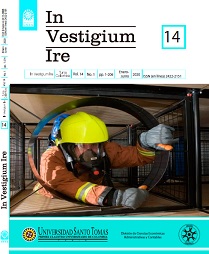Caractérisation du profil de la femme entrepreneur de la municipalité de Silvania
##plugins.themes.bootstrap3.article.main##
Résumé
L'étude fait référence à une recherche appliquée dans la municipalité de Silvania, dont l'objectif était de déterminer les caractéristiques sociales, économiques et culturelles qui définissent la femme entreprenante dans la municipalité de Silvania, département de Cundinamarca; à partir d'un échantillon aléatoire de 50 femmes, qui, à la date de l'étude, avaient une entreprise, certaines formalisées et d'autres sans gérer leur enregistrement fiscal unique -RUT-. L'instrument de base utilisé a été un entretien accompagné d'une enquête destinée aux microentrepreneurs de la zone urbaine de la municipalité, générant une approche descriptive et en même temps, avec une approche exploratoire, puisqu'aucune étude n'a été faite sur le sujet. Parmi les résultats constatés, on note le manque de connaissance des femmes microentrepreneurs par rapport aux programmes gouvernementaux de soutien à l'entreprenariat et d'autre part, l'importance et la motivation à obtenir une formation pour renforcer les stratégies durables de leurs entreprises.
##plugins.themes.bootstrap3.article.details##
Comment citer
Ferla Silva, L. M., Rodríguez Moscoso, C. M., & Gutiérrez Castaño, O. L. (2020). Caractérisation du profil de la femme entrepreneur de la municipalité de Silvania. In Vestigium Ire, 14(1), 27-40. Consulté à l’adresse http://revistas.ustatunja.edu.co/index.php/ivestigium/article/view/2022
Numéro
Rubrique
Artículos Vol. 14-1

Ce travail est disponible sous licence Creative Commons Attribution - Pas d'Utilisation Commerciale - Pas de Modification 4.0 International.
Investigium Ire de http://revistas.ustatunja.edu.co/index.php/ivestigium est sous licence Creativie Commons Attribution - Pas d'Utilisation Commerciale - Pas de Modification 4.0 International (CC BY-NC-ND 4.0)
Références
Castellanos, Rivas & Gálvez, 2019. La formación de emprendedores sociales desde algunos programas de Contaduría Pública. Revista In Vestigium Ire. 2018, Vol. 12, No. 1. pp. 165-185. Universidad Santo Tomás, sede Tunja. En [http://revistas.ustatunja.edu.co/index.php/ivestigium/article/view/1696/1544]
Cheston, S., & Kuhn, L. (2001). Empoderamiento de la mujer a través de las microfinanzas.
Campaña de la Cumbre del Microcrédito (IMF- ONG).
Davico, G. (2004). http://csoc.usal.edu.ar/IDICSO. Obtenido de http://csoc.usal.edu.ar/IDICSO: https://racimo.usal.edu.ar/id/eprint/86
Ferber, M. A., & Nelson, J. A. (2004). Más allá del hombre económico. España: Ediciones Cátedra.
Henríquez, D. M., Mosquera, S. C., & Arias, S. A. (2010). La creación de empresas en
Colombia desde las percepciones femenina y masculina. Economía Gestión y Desarrollo, Cali -Colombia, 61-77.
Hernández, B. W. (2019). Género en el Perú: Nuevos enfoques, miradas interdisciplinarias. Perú: Fondo editorial universidad de Lima.
Marulanda, V. Á., & Morales, G. S. (2016). Entorno y motivaciones para emprender. Rev. Escuela de Administración de Negocios. No. 81, 12- 28.
Mendoza, O. M., & Chapulín, C. J. (2015). Turismo, trabajo femenino y empoderamiento de las mujeres en bahías de Huatulco, Oaxaca - México. Estudios y Perspectivas en Turismo Volumen 24, 316 – 335.
Moreno, Z. H., Moreno, M. R., & Santa Ana, E. M. (2016). Las Universidades públicas autónomas mexicanas: Licenciatura en ingeniería y su relación con el fomento académico de ser emprendedor. In Vestigium Ire, 108-138.
Robles, Velásquez, Gutiérrez & González, 2014. Revista In Vestigium Ire. 2015, Vol. 8, No. 1. pp. 18-34. Universidad Santo Tomás, sede Tunja. En [http://revistas.ustatunja.edu.co/index.php/ivestigium/article/view/999]
Rodríguez, E. C. (2015). Economía feminista del cuidado. Nueva Sociedad N° 256, 30-44
Ruiz, N. J., Camelo, O. C., & Coduras, M. A. (2012). Mujer y desafío emprendedor en España. Características y determinantes. Economía industrial, ISSN 0422-2784, Nº 383, 13- 22.
Saavedra, G. M., & Camarena, A. M. (2015). Retos para el emprendimiento femenino en América Latina. Criterio Libre, 129-152.
Sánchez, C. R. (2006). Emprendimiento femenino. Pobreza cualitativa y microfinanzas, 83 -103.
Velásquez, J. (2007). El microcrédito: Sostenibilidad financiera vs. impacto sobre la pobreza. Dialnet, 139p
Cheston, S., & Kuhn, L. (2001). Empoderamiento de la mujer a través de las microfinanzas.
Campaña de la Cumbre del Microcrédito (IMF- ONG).
Davico, G. (2004). http://csoc.usal.edu.ar/IDICSO. Obtenido de http://csoc.usal.edu.ar/IDICSO: https://racimo.usal.edu.ar/id/eprint/86
Ferber, M. A., & Nelson, J. A. (2004). Más allá del hombre económico. España: Ediciones Cátedra.
Henríquez, D. M., Mosquera, S. C., & Arias, S. A. (2010). La creación de empresas en
Colombia desde las percepciones femenina y masculina. Economía Gestión y Desarrollo, Cali -Colombia, 61-77.
Hernández, B. W. (2019). Género en el Perú: Nuevos enfoques, miradas interdisciplinarias. Perú: Fondo editorial universidad de Lima.
Marulanda, V. Á., & Morales, G. S. (2016). Entorno y motivaciones para emprender. Rev. Escuela de Administración de Negocios. No. 81, 12- 28.
Mendoza, O. M., & Chapulín, C. J. (2015). Turismo, trabajo femenino y empoderamiento de las mujeres en bahías de Huatulco, Oaxaca - México. Estudios y Perspectivas en Turismo Volumen 24, 316 – 335.
Moreno, Z. H., Moreno, M. R., & Santa Ana, E. M. (2016). Las Universidades públicas autónomas mexicanas: Licenciatura en ingeniería y su relación con el fomento académico de ser emprendedor. In Vestigium Ire, 108-138.
Robles, Velásquez, Gutiérrez & González, 2014. Revista In Vestigium Ire. 2015, Vol. 8, No. 1. pp. 18-34. Universidad Santo Tomás, sede Tunja. En [http://revistas.ustatunja.edu.co/index.php/ivestigium/article/view/999]
Rodríguez, E. C. (2015). Economía feminista del cuidado. Nueva Sociedad N° 256, 30-44
Ruiz, N. J., Camelo, O. C., & Coduras, M. A. (2012). Mujer y desafío emprendedor en España. Características y determinantes. Economía industrial, ISSN 0422-2784, Nº 383, 13- 22.
Saavedra, G. M., & Camarena, A. M. (2015). Retos para el emprendimiento femenino en América Latina. Criterio Libre, 129-152.
Sánchez, C. R. (2006). Emprendimiento femenino. Pobreza cualitativa y microfinanzas, 83 -103.
Velásquez, J. (2007). El microcrédito: Sostenibilidad financiera vs. impacto sobre la pobreza. Dialnet, 139p


